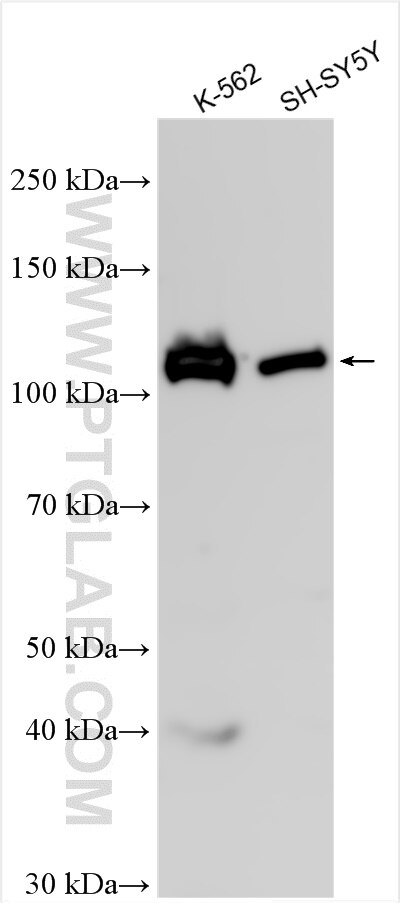PTPN4 Polyclonal antibody
PTPN4 Polyclonal Antibody for WB, ELISA
Host / Isotype
Rabbit / IgG
Reactivity
human
Applications
WB, ELISA
Conjugate
Unconjugated
Cat no : 11131-1-AP
Synonyms
Validation Data Gallery
Tested Applications
| Positive WB detected in | K-562 cells, SH-SY5Y cells |
Recommended dilution
| Application | Dilution |
|---|---|
| Western Blot (WB) | WB : 1:1000-1:4000 |
| It is recommended that this reagent should be titrated in each testing system to obtain optimal results. | |
| Sample-dependent, Check data in validation data gallery. | |
Product Information
11131-1-AP targets PTPN4 in WB, ELISA applications and shows reactivity with human samples.
| Tested Reactivity | human |
| Host / Isotype | Rabbit / IgG |
| Class | Polyclonal |
| Type | Antibody |
| Immunogen | PTPN4 fusion protein Ag1585 |
| Full Name | protein tyrosine phosphatase, non-receptor type 4 (megakaryocyte) |
| Calculated Molecular Weight | 106 kDa |
| Observed Molecular Weight | 106 kDa |
| GenBank Accession Number | BC010674 |
| Gene Symbol | PTPN4 |
| Gene ID (NCBI) | 5775 |
| RRID | AB_2173540 |
| Conjugate | Unconjugated |
| Form | Liquid |
| Purification Method | Antigen affinity purification |
| Storage Buffer | PBS with 0.02% sodium azide and 50% glycerol pH 7.3. |
| Storage Conditions | Store at -20°C. Stable for one year after shipment. Aliquoting is unnecessary for -20oC storage. 20ul sizes contain 0.1% BSA. |
Background Information
PTPN4 is a member of the protein tyrosine phosphatase (PTP) family. PTPs are known to be signaling molecules that regulate a variety of cellular processes including cell growth, differentiation, mitotic cycle, and oncogenic transformation. This protein contains a C-terminal PTP domain and an N-terminal domain homologous to the band 4.1 superfamily of cytoskeletal-associated proteins. This PTP has been shown to interact with glutamate receptor delta 2 and epsilon subunits, and is thought to play a role in signalling downstream of the glutamate receptors through tyrosine dephosphorylation.
Protocols
| Product Specific Protocols | |
|---|---|
| WB protocol for PTPN4 antibody 11131-1-AP | Download protocol |
| Standard Protocols | |
|---|---|
| Click here to view our Standard Protocols |


